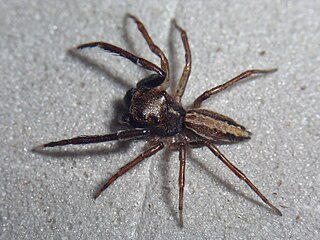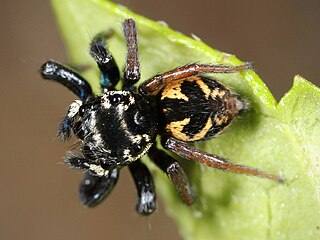
Acragas is a genus of jumping spiders that was first described by Eugène Louis Simon in 1900. The name is derived from the Greek name of Agrigentum, an ancient city on Sicily.

Akela is a genus of jumping spiders, consisting of three described species. Two of these occur in Central and South America and the third in Pakistan.
Ashtabula is a genus of jumping spiders that was first described by G. W. Peckham & E. G. Peckham in 1894.
Avitus is a genus of jumping spiders that was first described by George and Elizabeth Peckham in 1896.

Bagheera is a genus of jumping spiders within the family Salticidae, subfamily Salticinae and subtribe Dendryphantina. The genus was first described by George Peckham & Elizabeth Peckham in 1896. The name is derived from Bagheera, a character from Rudyard Kipling's Jungle Book.

Beata is a genus of jumping spiders that was first described by George Peckham & Elizabeth Peckham in 1895.

Breda is a genus of jumping spiders that was first described by George Peckham & Elizabeth Peckham in 1894.

Chapoda is a genus of jumping spiders that was first described by George Peckham & Elizabeth Peckham in 1896.

Chira is a genus of jumping spiders that was first described by George Peckham & Elizabeth Peckham in 1896. It is currently named after Rio Chira, a river in Peru, but the Peckhams originally called the genus Shira, later emended by Eugène Simon.

Corythalia is a genus of jumping spiders that was first described by Carl Ludwig Koch in 1850. The genus is distributed throughout most of the Western Hemisphere. Species of this genus are found in The Americas.

Freya is a genus of jumping spiders that was first described by Carl Ludwig Koch in 1850. The name is derived from Freya, the fertility goddess of Norse mythology.

Messua is a spider genus of the family Salticidae.

Pachomius is a genus of jumping spiders that was first described by George and Elizabeth Peckham in 1896. Uspachia was merged into genus Romitia in 2007, and all nine species were merged into Pachomius in 2015. The name is derived from Pachomius, the founder of cenobitic monasticism.
Pensacola is a genus of jumping spiders that was first described by George and Elizabeth Peckham in 1885.

Sarinda is a genus of ant mimicking jumping spiders that was first described by George and Elizabeth Peckham in 1892.

Sassacus is a genus of jumping spiders that was first described by George and Elizabeth Peckham in 1895. It is likely named after Sassacus, a Native American chief of the 16th and 17th century.

Sidusa is a genus of jumping spiders that was first described by George and Elizabeth Peckham in 1895.

The Dendryphantina are a subtribe of jumping spiders that occur mainly in the New World. The subtribe was first defined by Anton Menge in 1879 as Dendryphantidae. Females of the subtribe generally show paired spots on the abdomen, and the males often have enlarged chelicerae. Females in this subtribe typically have S-shaped epigynal openings.

Bagheera kiplingi is a species of jumping spider found in Central America, including Mexico, Costa Rica, and Guatemala. It is the type species of the genus Bagheera, which includes three other species, including B. prosper. B. kiplingi is notable for its peculiar diet, which is mostly herbivorous. No other known species of omnivorous spider has such a markedly herbivorous diet.
Xanthofreya is a genus of jumping spiders. It was first described in 2015 by G. B. Edwards.














